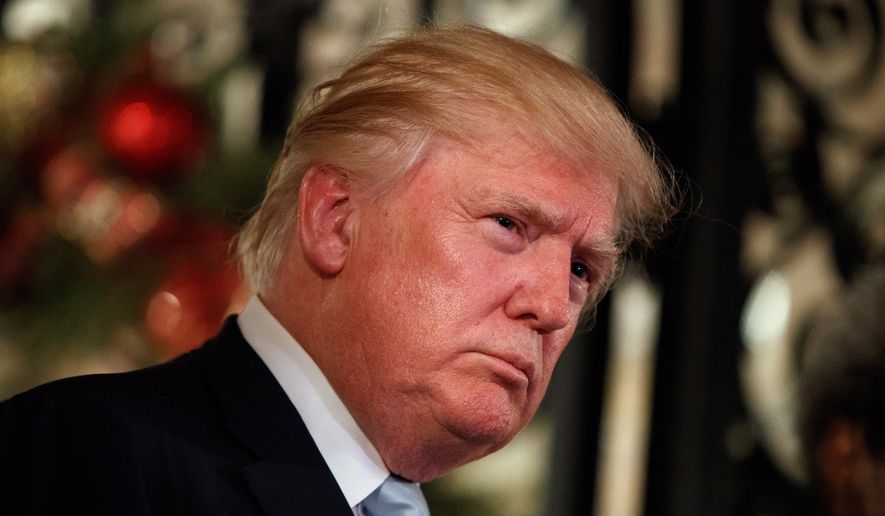Senate Majority Leader Mitch McConnell on Wednesday essentially killed any notion of a special committee to investigate Russia’s possible role in cyberhacks of the DNC as the nation’s top intelligence leaders prepared to testify on Capitol Hill for the first time since the election of Donald Trump.
Mr. McConnell said the upper chamber’s military and intelligence panels would conduct separate inquiries into cyberattacks of the Democratic National Committee, which the White House has blamed on Russia.
Director of National Intelligence James R. Clapper, along with Pentagon intel chief Marcel Lettre and Adm. Mike Rogers, head of U.S. Cyber Command, will testify before members of the full Senate Armed Services panel Thursday.
Sen. John McCain, the Arizona Republican who had spearheaded an effort on Capitol Hill to stand up a special committee to review Moscow’s cyberoperations during the election, chairs the panel that will dig into overall U.S. cyberwarfare capabilities.
“It’s just this type of issue — something both parties say is too important to become a partisan football — where we often see the hard work of legislating and oversight transcend party,” Mr. McConnell, a Kentucky Republican, said Wednesday on the Senate floor.
Prior to Thursday’s hearing, a classified internal review conducted by the CIA shortly after the election reportedly concluded that Moscow deliberately tried to help Mr. Trump win the presidency.
It will be the first public appearance for the intelligence community’s top officials since the White house ordered a review of Russia’s complicity in a series of cyberhacks into the DNC and the personal email of former Hillary Clinton campaign manager John Podesta.
The White House-mandated review, which is nearly complete, “will address what Russia was doing, how it was doing it, and how we know that,” CIA Director John O. Brennan said.
The Senate intelligence panel will lead a separate bipartisan investigation into the depth and breadth of Moscow’s penetration into American networks during the election.
During the campaign, Hillary Clinton’s team repeatedly charged the Russian hacks were a calculated effort to boost Mr. Trump’s bid for the White House. Mr. Trump has repeatedly questioned the accuracy of reports about Russia’s role.
The President-elect has likened initial reports of U.S. intelligence assessments on Russian interference to the false flag findings on Iraq’s supposed stockpiles of weapons of mass destruction that led the U.S. to war in the country in 2003.
On Wednesday Mr. Trump tweeted a scheduled briefing on Russian cyberoperations with Mr. Clapper, Mr. Brennan and FBI Director James B. Comey had been delayed at the last minute, insinuating they needed more time to bolster their inconclusive findings on Moscow’s role.
Officials from the intel community said Wednesday that no request to delay the Russia briefing had been made.
During a visit to Capitol Hill Wednesday, Vice President-elect Mike Pence told reporters that Mr. Trump’s comments reflected a “sincere and healthy American skepticism about intelligence conclusions.”
Mr. Trump has also cited WikiLeaks founder Julian Assange’s repeated denials that Russian operatives provided the hacked emails from Mr. Podesta and the DNC, which were posted on the site. A WikiLeaks reporter has reportedly said the information was provided by a disgruntled DNC insider.
“Julian Assange said ’a 14 year old could have hacked Podesta’ — why was DNC so careless? Also said Russians did not give him the info!” Mr. Trump tweeted Wednesday.
That claim drew sharp ridicule from Mr. Brennan as well as top Republican lawmakers.
“I hope the president-elect will get his information and trust the American patriots who work in the intelligence community who swear oath and allegiance to the Constitution, and not some guy hiding from the law who has a record of undercutting and undermining American democracy,” Sen. Lindsey Graham, South Carolina Republican, said on CNN Wednesday.
House Speaker Rep. Paul D. Ryan dismissed Mr. Assange Wednesday as a “sycophant for Russia,” telling radio host Hugh Hewitt that WikiLeaks simply “steals data and compromises national security.”
When asked if Mr. Assange’s claims were a viable source to rebuff the agency’s claims against Russia, Mr. Brennan replied: “He’s not exactly a bastion of truth and integrity.”
• David Sherfinski contributed to this report.
• Carlo Muñoz can be reached at cmunoz@washingtontimes.com.




Please read our comment policy before commenting.